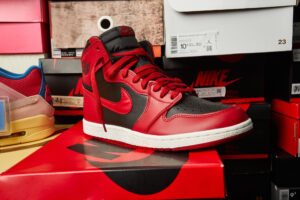The resale sneaker industry is quickly becoming as popular as the brand new shoe market. Shoes are almost always one of the top-selling items in a consignment store’s inventory. Used and older shoes hold value due to demand from sneakerheads and collectors. Conversely, supply chain issues are causing deliverability or manufacturing issues with “hot shoes,” causing resellers to buy them up and resell them at a substantial markup.
In February 2021, research firm Piper Sandler estimated the resale shoe market was worth $10 billion – a $4 billion increase from 2019. This growth is only expected to remain strong and grow to $30 billion by 2030, as stated in a study conducted by Cowan Research Equity.
As a consignment store buying and selling countless pairs of shoes, properly managing this can become a real sticking point for your business. Between handling sneaker selection, pricing details based on shoe brand, style and size, and other factors, a shoe store inventory management system can be essential to running a business successfully.
In order to best serve your buyers and maximize productivity, proper shoe store inventory management can help revolutionize how you set up your sneaker resale strategy.
The Demand Surrounding Resale Shoes
 There is a large population of buyers who are interested in reselling shoes. Resellers will wait long hours in line for the opportunity to buy hot shoes for resale. Often, these “hot shoes” are produced under a strict limited quantity, causing the demand and value to increase.
There is a large population of buyers who are interested in reselling shoes. Resellers will wait long hours in line for the opportunity to buy hot shoes for resale. Often, these “hot shoes” are produced under a strict limited quantity, causing the demand and value to increase.
Part of excelling within the resale sneaker market is understanding the bell curve attached to the products. Several factors affect the value of resale shoes such as size, condition, shoe availability, age, and more. Depending on these factors, shoes can be marked up 200% or more than the original retail price.
Over the last couple of years, the sneaker resale market has ballooned in popularity and financial value as multiple health and economic changes have impacted buying and selling. The COVID-19 pandemic and associated health protocols have limited customers from being able to stand in line for shoe releases and events. This has resulted in digital lottery systems for which these shoes can be purchased — only amplifying the demand while decreasing the buying opportunity available to many dedicated buyers.
Additionally, shipment delays and factory shutdowns have resulted in supply chain disruptions which have caused a variety of sneaker delays and lack of product production for many major sneaker companies such as Nike and New Balance. All of these factors together have made shoe resale very appealing to many resellers and consignors.
Shoes Age Like a Fine Wine
The current landscape of the shoe resale industry isn’t just a spike in the market. A select number of items traditionally perform strongly in the “second-hand” market, including sneakers, luxury shoes, handbags, vintage cars, and more.
Many of the shoes, whether sneakers or luxury shoes, are valued at high prices due to the limited production numbers that the designing company puts out. This leads to limited quantity shoes becoming social media stars and quickly gaining much fanfare — further driving the market price skyward.
Additionally, the longer someone holds a limited-run pair of shoes, the greater the value increases. Recently, a pair of Air Jordans from the 1980s sold for over $15,000 at a charity event. The Footwear Distributors and Retailers of America (FDRA) have stated that shoewear prices are seeing the fastest rate of increase in the past 20 years, with year-to-date prices up by 3.2%. According to FDRA’s monthly report, Footwear News, the main causes behind the price hike include import charges, as well as duties and higher wages for retail workers. Footwear import charges increased by $146.3 million USD in August with duties also rising to $320.6 million USD.
A Shoe Store Inventory Management System That Works

As your business looks to capitalize on the sneaker resale market, we recommend a dedicated inventory management and software system in place. Managing a wide variety of shoe products can become difficult when handing multiple sizes, colors, styles, and even consignors. If you have merchandise spread between dozens or even hundreds of stores and online inventory in warehouses, this can make locating and selling the sneakers to a potential customer a headache. As your inventory grows, it becomes more complicated to find a specific item, causing lost time for employees, and frustration for customers.
If you’re new or growing, set yourself up for success before these potentials become real problems. Aravenda offers a comprehensive shoe store inventory management system. Our platform gives owners and their employees an easier and more efficient way to handle shoe inventory.
Custom Software Solutions Built Exclusively For Shoe Resellers
Aravenda knows how important technology is to your sneaker and streetwear business. Living in an era where data drives better decision-making, increases efficiency, and reduces costs, using the right software is critical to experience these rewards. We are one of the only software companies that offer unique features critical to your business like:
- Showing all consignors’ items under one shoe listing, with different colors, conditions, sizes and prices on your website
- Seamless inbound shipping options
- Remote item entry and pre-approval processes
- Fully integrated options to Shopify payments for brick and mortar and online sellers
- Location fields used for warehousing, multi-state and multi-country shippers
With StockX integration, sneaker resellers will be able to use images and descriptions from StockX for their shoe listings. Product variant capabilities include multiple consignors, sizes, prices, colors, and conditions — done all in one listing.
As the sneaker resale market projects to grow over the next several years, it is critical that consignment shops invest in the right tools in order to optimize their resale results. For more information on our shoe store inventory management system, contact us here. Ready to start a free trial? We’ve got you covered.
